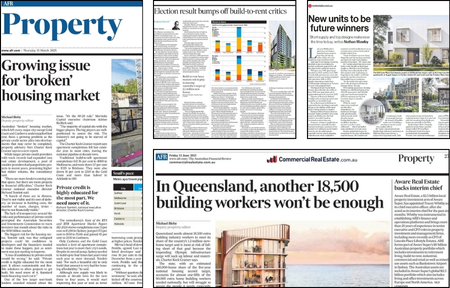As featured in PropertyGuru Asia Property Awards
17 December 2024
Ivan Lam of property advisory firm Charter Keck Cramer specialises in helping overseas clients navigate Australia’s complex real estate dynamics.
As executive director of international business at Charter Keck Cramer, Ivan Lam has spent the past decade driving innovation in Australia’s property and investment sectors. Lam’s background in retail and business banking, particularly in Asian banking, has helped him drive business development and foster international client relationships, with a focus on the AsiaPacific region.
Charter Keck Cramer is Australia’s leading independent property advisory firm and seeks to help its clients improve their operational efficiencies and navigate complex market dynamics. Lam draws on his extensive industry knowledge and strategic vision to help deliver strong client outcomes.
Lam also serves as the national vice president of the Hong Kong Australia Business Association (HKABA), where he champions initiatives to strengthen trade and investment ties between Australia and Hong Kong.
He also serves as a board advisor for CIX Capital, an Australia-based investment management company that specialises in commercial real estate finance and advisory services. There, he provides strategic guidance to enhance investment opportunities and drive capital growth.
We sat down with Lam to discuss the Australian real estate sector, including the unique challenges of buying and managing property there, the countries making substantial investments in the country, and the outlook for 2025.
What are some of the main challenges that overseas clients typically face when purchasing property in Australia?
The first is understanding the complex regulatory framework, including the requirements set by the Foreign Investment Review Board (FIRB). Additionally, there can be significant cultural differences that affect negotiations and expectations around property transactions. Foreign buyers may also struggle with accessing reliable local market information, which is crucial for making informed decisions. Finally, securing financing can be a challenge, as many Australian banks have stringent lending criteria for nonresidents.
Significant cultural differences can affect negotiations. Foreign buyers may also struggle with accessing reliable local market information, which is crucial for making informed decisions
How important are Chinese buyers in the Australian property market? And how has that shifted with China’s softening economy?
Chinese buyers have historically been a significant force in the Australian property market, driven by factors such as capital preservation, passing on advantages to the next generation, and lifestyle aspirations. However, we’ve seen a shift with the recent softening of China’s economy and increased capital controls. While interest has declined, the market is evolving with a more diverse range of buyers from countries like India, Southeast Asia, and the Americas stepping in. This diversification could stabilise the market and potentially lead to new opportunities, but it also means that Australian developers and agents must adapt their strategies to attract a broader spectrum of investors.
What other countries are key buyers of Australian real estate?
Beyond China, we’re witnessing substantial interest from several countries. The United States, United Kingdom, India, Malaysia, Vietnam, Singapore, Hong Kong, and New Zealand are notable players in the Australian property market. These investors are often attracted by Australia’s strong economic fundamentals, lifestyle, similar time zones (for New Zealand and Asian countries), politically stable and educational opportunities, especially in the capital cities.
What is unique about the process for foreign buyers who want to purchase real estate in Australia?
The process for foreign buyers in Australia is unique primarily due to the FIRB approval requirement. Buyers must submit an application detailing their identity and investment intentions, which is a crucial step for compliance. Additionally, foreign buyers are generally restricted to purchasing new properties or vacant land, limiting their options compared to domestic buyers. Understanding these regulations is critical for successful transactions. It’s also important to note the substantial FIRB fee, which is based on the purchase price. However, many developers targeting the overseas market often provide rebates or may offer a New Dwelling Exemption Certificate, allowing the ultimate overseas purchaser to bypass the FIRB approval process altogether.
Do you advise clients on sustainable aspects of real estate? What are the key considerations, in your opinion?
Sustainability is an increasingly vital consideration in real estate. I advise clients to evaluate properties based on their energy efficiency, use of sustainable materials, and water conservation measures. Additionally, I encourage clients to consider the location’s environmental impact, including proximity to public transport and green spaces. Properties that are energy-efficient not only have a lower environmental footprint but also appeal to a growing segment of environmentally conscious buyers and tenants.
What types of properties are most popular among overseas investors, and why?
Apartments in urban areas tend to be the most popular among overseas investors due to their potential for rental yields, or for their children to stay while they are studying in Australia. Additionally, house-and-land packages in emerging suburban areas are gaining traction, appealing to those looking for long-term investments and capital growth. These property types are attractive because they often come with amenities and are located near essential services, which is appealing for both rental and resale opportunities.
Are there any restrictions or regulations that foreign buyers should be aware of?
Foreign buyers should be aware of several key regulations, including the requirement to obtain FIRB approval before any purchase and the application of additional taxes, such as the foreign buyer surcharge in some states. Established residential properties are generally off-limits, emphasising the need for foreign investors to focus on new developments or vacant land.
What financing options are available to foreign buyers?
Foreign buyers have various financing options available to them, including loans from Australian banks and international banks or lenders in their home countries. However, these options often come with stricter requirements, such as higher deposit amounts and proof of income. Some buyers might choose to engage financial advisors, or brokers, familiar with both local and international lending practices, can help streamline this process.
What areas or regions do you see as having the most potential for growth in the Australian property market?
Regions such as Southeast Queensland, particularly Brisbane and the Gold Coast, are gaining attention due to infrastructure developments and population growth. Additionally, areas around all major capital cities that are undergoing urban renewal are showing promise. Regional centres are also becoming increasingly attractive as remote work becomes more common, allowing people to seek lifestyle options outside major urban centres.
How can overseas investors manage their property remotely?
Overseas investors can manage their properties remotely by employing local property management services. These professionals handle everything from tenant relations to maintenance issues. Additionally, utilising technology, such as property management apps and online communication tools, can help keep investors informed about their properties’ performance.
What resources or services do you offer to help clients conduct due diligence on a property?
We equip our clients with a range of comprehensive resources for conducting due diligence. This includes access to detailed market research and tailored pre-purchase advice for example. Our goal is to ensure clients are well-informed and confident in their investment decisions, backed by insights from our expert team.
What advice do you have for overseas clients who are considering entering the Australian property market for the first time?
For overseas clients venturing into the Australian property market for the first time, my foremost advice is to engage in thorough research and seek professional guidance. It’s essential to understand local market dynamics, legal frameworks, and financial implications. I also highly recommend visiting Australia to gain firsthand experience of the properties and neighbourhoods being considered, as this will provide invaluable context for their investment decisions.
What is on the horizon for you and Charter Keck Cramer as we head into 2025?
As we look toward 2025, Charter Keck Cramer is committed to enhancing our services by integrating advanced data analytics and sustainability initiatives into our consultancy. Our goal is to empower clients to navigate the evolving market landscape while prioritising responsible and impactful investment strategies. We envision positioning ourselves at the forefront of innovative solutions that meet the diverse needs of both local and international investors.



